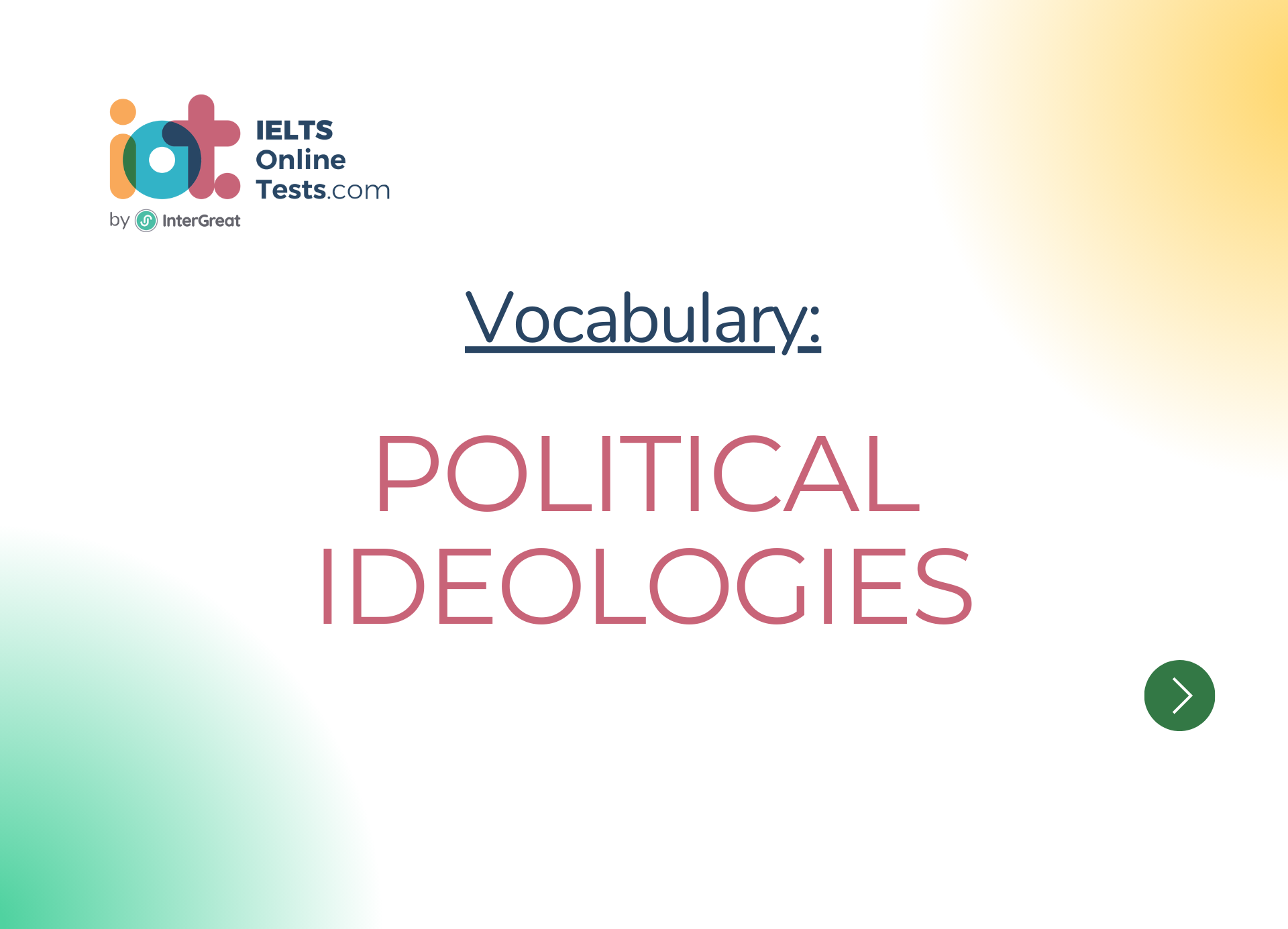
Political ideologies
Below is a comprehensive list of vocabulary related to political ideologies, along with their definitions. Understanding these terms will help you discuss different political beliefs and theories during the IELTS exam or any political discussions.
Liberalism:
- Definition: A political ideology that emphasizes individual freedoms, civil liberties, limited government intervention in the economy, and the protection of human rights.
Conservatism:
- Definition: A political ideology that supports traditional values, social stability, and limited government involvement, often favoring gradual change rather than radical reforms.
Socialism:
- Definition: A political and economic ideology advocating for public ownership and control of the means of production, as well as a more equitable distribution of wealth and resources.
Communism:
- Definition: A political and economic ideology seeking to create a classless society where the means of production are collectively owned, and resources are distributed according to need.
Fascism:
- Definition: A political ideology characterized by dictatorial power, extreme nationalism, suppression of opposition, and often racist or xenophobic beliefs.
Anarchism:
- Definition: A political ideology that advocates for the abolition of all forms of hierarchical authority, including the state, and the establishment of a society based on voluntary cooperation.
Social Democracy:
- Definition: A political ideology that combines elements of socialism and liberalism, seeking to achieve social justice and equality through democratic means and a mixed economy.
Nationalism:
- Definition: A political ideology that prioritizes the interests and identity of a nation-state, often emphasizing its cultural, historical, and territorial distinctiveness.
Environmentalism:
- Definition: A political ideology that prioritizes the protection of the environment and sustainable practices in economic and social policies.
Feminism:
- Definition: A political ideology advocating for gender equality and challenging patriarchal social structures and norms.
Capitalism:
- Definition: An economic and political system in which the means of production and distribution are privately owned, and economic decisions are driven by supply and demand.
Totalitarianism:
- Definition: A political system in which the government exercises total control over almost all aspects of public and private life, often associated with oppressive regimes.
Democratic Socialism:
- Definition: A political ideology that advocates for a democratic political system alongside a mixed economy, with a combination of public and private ownership.
Marxism:
- Definition: A political and economic theory based on the ideas of Karl Marx, emphasizing the struggle between social classes and the eventual establishment of a classless society.
Neoliberalism:
- Definition: A political and economic ideology that promotes free-market capitalism, reduced government intervention, and deregulation.
Populism:
- Definition: A political ideology that claims to represent the interests of the common people against the elites or established institutions.
Secularism:
- Definition: A political ideology advocating for the separation of religion and state, ensuring that government decisions are not influenced by religious beliefs.
Pluralism:
- Definition: A political ideology that supports diversity and the inclusion of various groups and interests in decision-making processes.
Social Conservatism:
- Definition: A political ideology that emphasizes the preservation of traditional social values and institutions.
Progressivism:
- Definition: A political ideology advocating for social and political reforms to address societal issues and promote greater equality.
Neoconservatism:
- Definition: A modern form of conservatism that emphasizes a strong military, interventionist foreign policy, and promotion of democracy worldwide.
Libertarianism:
- Definition: A political ideology advocating for minimal government intervention in both economic and social affairs, emphasizing individual liberties and personal responsibility.
Communitarianism:
- Definition: A political ideology that prioritizes the common good and the well-being of communities, valuing social cohesion and solidarity.
Internationalism:
- Definition: A political ideology promoting cooperation and collaboration between nations, often involving global governance and diplomacy.
Isolationism:
- Definition: A political ideology advocating for a nation's withdrawal from international affairs and a focus on domestic issues.
Economic Nationalism:
- Definition: A political ideology emphasizing protectionist economic policies and the prioritization of national economic interests.
Pacifism:
- Definition: A political ideology that rejects the use of violence and advocates for peaceful conflict resolution.
Pragmatism:
- Definition: A political ideology that prioritizes practical solutions and evidence-based policies over strict adherence to ideological principles.
Technocracy:
- Definition: A political ideology advocating for government or decision-making by technical experts or scientists based on their knowledge and expertise.
Globalism:
- Definition: A political ideology supporting increased international cooperation and integration, often emphasizing global governance and interconnectedness.
Remember, understanding these political ideologies and their associated vocabulary will enhance your ability to discuss political concepts and issues in English, particularly in the context of academic or professional settings.




